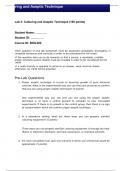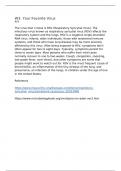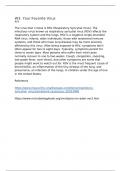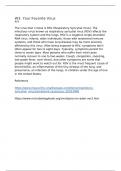Biol 202 week 3 - Study guides, Class notes & Summaries
Looking for the best study guides, study notes and summaries about Biol 202 week 3? On this page you'll find 15 study documents about Biol 202 week 3.
All 15 results
Sort by

-
BIOL202 Week 3 Lab 3 Culturing and Aseptic Technique APU
- Other • 9 pages • 2024
- Available in package deal
-
- $19.99
- + learn more
Lab3:CulturingandAsepticTechnique(100points) Eachquestiononthelabworksheetmustbeansweredcompletely,thoroughly,incompletesentencesand correctlyin orderto beconsideredforfullcredit Ifthequestionasksyoutodoresearchorfindasource,areputable,credibleand/orscholarlysourcecitationmustbeincluded inorder tobeconsidered for fullcredit Ifamathformulaisrequiredtoarrivetoananswer,workmustbeshownotherwise,nocreditwill beawarded Pre-LabQuestions 1. Proper aseptic technique is crucial to ensur...

-
BIOL202 Week 3 Quiz
- Exam (elaborations) • 3 pages • 2023
- Available in package deal
-
- $20.99
- + learn more
1. Question: During the process of a latent viral infection: 2. Question: This eukaryote is of lesser interest to microbiologist compared to the others. 3. Question: Which one of these viruses is able to enter into latency? 4. Question: A fungus that can cause a disease in humans results in; 5. Question: The asexually reproducing bread mold. Rhizopus stolonifer. produces: 6. Question: This microbe was historically known as blue-green algae. 7. Question: Found only in select, cellular life....

-
BIOL202 Week 3 Quiz
- Exam (elaborations) • 3 pages • 2023
- Available in package deal
-
- $24.49
- + learn more
1. Question: During the process of a latent viral infection: 2. Question: This eukaryote is of lesser interest to microbiologist compared to the others. 3. Question: Which one of these viruses is able to enter into latency? 4. Question: A fungus that can cause a disease in humans results in; 5. Question: The asexually reproducing bread mold. Rhizopus stolonifer. produces: 6. Question: This microbe was historically known as blue-green algae. 7. Question: Found only in select, cellular life....

-
BIOL202 Week 3 Quiz
- Exam (elaborations) • 3 pages • 2023
- Available in package deal
-
- $24.49
- + learn more
1. Question: During the process of a latent viral infection: 2. Question: This eukaryote is of lesser interest to microbiologist compared to the others. 3. Question: Which one of these viruses is able to enter into latency? 4. Question: A fungus that can cause a disease in humans results in; 5. Question: The asexually reproducing bread mold. Rhizopus stolonifer. produces: 6. Question: This microbe was historically known as blue-green algae. 7. Question: Found only in select, cellular life....

-
BIOL202 Week 3 Quiz
- Exam (elaborations) • 3 pages • 2023
-
- $25.49
- + learn more
1. Question: During the process of a latent viral infection: 2. Question: This eukaryote is of lesser interest to microbiologist compared to the others. 3. Question: Which one of these viruses is able to enter into latency? 4. Question: A fungus that can cause a disease in humans results in; 5. Question: The asexually reproducing bread mold. Rhizopus stolonifer. produces: 6. Question: This microbe was historically known as blue-green algae. 7. Question: Found only in select, cellular life....

-
BIOL202 Week 3 Quiz Questions and Answers APU
- Exam (elaborations) • 3 pages • 2024
- Available in package deal
-
- $17.99
- + learn more
1. Question: During the process of a latent viral infection: 2. Question: This eukaryote is of lesser interest to microbiologist compared to the others. 3. Question: Which one of these viruses is able to enter into latency? 4. Question: A fungus that can cause a disease in humans results in; 5. Question: The asexually reproducing bread mold. Rhizopus stolonifer. produces: 6. Question: This microbe was historically known as blue-green algae. 7. Question: Found only in select, cellular life....

-
BIOL202 Week 3 Discussion; Your Favorite Virus
- Other • 1 pages • 2023
- Available in package deal
-
- $18.48
- + learn more
RSV The virus that I chose is RSV (Respiratory Syncytial Virus). The infectious virus known as respiratory syncytial virus (RSV) affects the respiratory system and the lungs. RSV is a negative single-stranded RNA virus. Infants, older individuals, those with weakened immune systems, and those who have lung disease may be more severely affected by this virus. After being exposed to RSV, symptoms don't often appear for two to eight days. Typically, symptoms persist for three to seven days. Mos...

-
BIOL202 Week 3 Discussion Your Favorite Virus APU
- Other • 1 pages • 2024
- Available in package deal
-
- $14.99
- + learn more
W3:YourFavoriteVirus RSV The virus that I chose is RSV (Respiratory Syncytial Virus). The infectious virusknownasrespiratorysyncytialvirus(RSV)affectstherespiratorysystemandthelungs. RSV is a negative single-stranded RNA virus. Infants, older individuals,those with weakened immune systems, and those who have lung disease maybe more severely affected by this virus. After being exposed to RSV, symptomsdon't often appear for two to eight days. Typically, symptoms persist for three toseven days...

-
BIOL202 Week 3 Quiz
- Exam (elaborations) • 3 pages • 2023
- Available in package deal
-
- $14.49
- + learn more
1. Question: During the process of a latent viral infection: 2. Question: This eukaryote is of lesser interest to microbiologist compared to the others. 3. Question: Which one of these viruses is able to enter into latency? 4. Question: A fungus that can cause a disease in humans results in; 5. Question: The asexually reproducing bread mold. Rhizopus stolonifer. produces: 6. Question: This microbe was historically known as blue-green algae. 7. Question: Found only in select, cellular life....
BIOL202 Week 3 Discussion; Your Favorite Virus

Study stress? For sellers on Stuvia, these are actually golden times. KA-CHING! Earn from your study resources too and start uploading now. Discover all about earning on Stuvia



